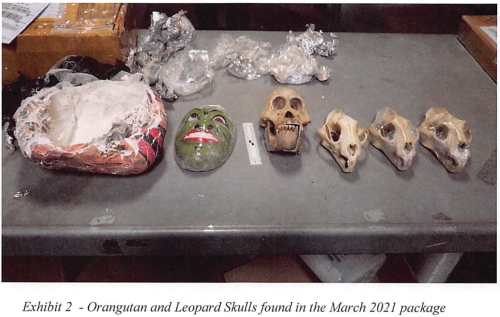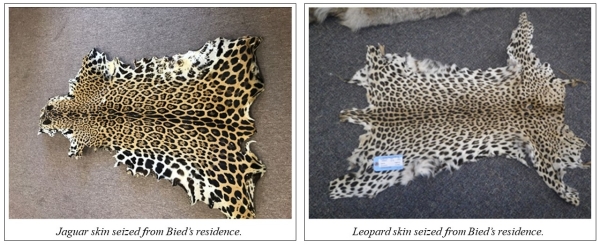U.S. also filed action to forfeit more than 100 wildlife parts including orangutan skulls, tiger skulls, jaguar skin and other parts from endangered, threatened, or protected species
BOSTON – A Reading, Mass. man has been charged with allegedly trafficking in wildlife parts from endangered and protected species.
Adam Bied, 39, is charged with two counts of conspiracy to smuggle goods into the United States, specifically, illegally imported wildlife parts, and three counts of violating the Lacey Act which prohibits trafficking in wildlife. It is alleged that the wildlife was protected by the Endangered Species Act (ESA) as well as the Convention on International Trade in Endangered Species of Wild Fauna and Flora (CITES).
“The illicit trafficking of endangered wildlife for financial gain is a grave offense that poses a significant threat to global conservation efforts and preservation of these species. Mr. Bied’s alleged conduct reflects a blatant disregard for the laws in place to safeguard our planet’s biodiversity. These laws and international treaties exist to protect endangered species from exploitation and to maintain ecological balance,” said Acting United States Attorney Joshua S. Levy. “In addition to the criminal charges, our office is seeking to forfeit the hundreds of animal parts seized from Mr. Bied’s home and a storage unit, including orangutan skulls, tiger skulls and jaguar skins. This forfeiture action sends a clear message that we will not only prosecute those who engage in illegal wildlife trafficking, but also take legal actions to strip them of their ill-gotten gains.”
According to court filings, beginning at least from January 2018 until June 2021, Bied bought, sold and traded in wildlife parts and products, with knowledge that many of the transactions were in violation of U.S. laws and regulations and knowingly failed to declare this wildlife upon importation into the United States.
Specifically, Bied allegedly placed orders with individuals in Cameroon and Indonesia who were in the businesses of killing and acquiring wildlife – including endangered and protected species – which he then resold or traded to customers in the United States. Bied did not possess a United States Fish and Wildlife Service (USFWS) import/export license or necessary CITES permits, and allegedly failed to declare the wildlife to the USFWS upon import.


The United States Attorney’s Office also filed a civil forfeiture complaint seeking to forfeit over 100 wildlife parts from endangered, threatened, or protected species seized by the USFWS in July 2021 from Bied’s residence, storage unit, and a vehicle. As alleged in the civil forfeiture complaint, many of the seized wildlife parts required a CITES permit and/or a USFWS declaration for lawful import and a USFWS import/export license to import wildlife for commercial purposes. Other wildlife parts are alleged to have been acquired in violation of the ESA or the Marine Mammal Protection Act (MMPA). The civil forfeiture complaint alleges that the wildlife parts are subject to civil forfeiture under federal law.
The wildlife parts identified in the civil forfeiture complaint include:
- Orangutan skulls;
- Tiger skulls;
- Leopard skin, skulls and claw;
- Jaguar skin and skull;
- African lion skulls;
- Polar bear skull;
- Narwhal tusk;
- Otter skeleton;
- Harp seal skull;
- South American fur seal skull;
- Elephant seal skull;
- Babirusa skulls;
- Mandrillus skulls;
- Wallaby skull; and
- Jackal skull.

Federal wildlife statutes and regulations prohibit international and illegal trade in vulnerable wildlife species. The ESA, the Lacey Act and CITES, as well as the accompanying regulations, prohibit the import, export, possession, transport, purchase and sale of protected species. The restrictions apply to live and dead wildlife specimens, as well as the skins, parts and products made in whole or in part from listed species. Additional documents are also required for wildlife protected by the CITES treaty, which regulates trade in endangered or threatened species through permit requirements.
The lawful importation of vulnerable wildlife species requires a CITES permit(s). The lawful importation of any foreign species requires a USFWS wildlife declaration. Individuals are also required to have a USFWS import/export license to import wildlife for commercial purposes.
The charges of conspiracy as well as the charges under the Lacey Act each provide for a sentence of up to five years in prison, three years of supervised release and a fine of up to $250,000. Sentences are imposed by a federal district court judge based upon the U.S. Sentencing Guidelines and statutes which govern the determination of a sentence in a criminal case.
Acting U.S. Attorney Levy and Ryan Noel, Special Agent in Charge of U.S. Fish and Wildlife Service, Office of Law Enforcement, Northeast Region, made the announcement today. This case was worked jointly with the United States Marshals Service and the Department of Justice’s Environment and Natural Resources Division’s Environmental Crimes Section. Assistant U.S. Attorneys Nadine Pellegrini, Chief of the National Security Unit, is prosecuting the case. Assistant U.S. Attorney Carol E. Head, Chief of the Asset Recovery Unit is prosecuting the civil forfeiture case.
The details contained in the charging document and civil forfeiture complaint are allegations. The defendant is presumed innocent unless and until proven guilty beyond a reasonable doubt in a court of law. The United States must establish that the wildlife parts are subject to forfeiture by a preponderance of the evidence.
